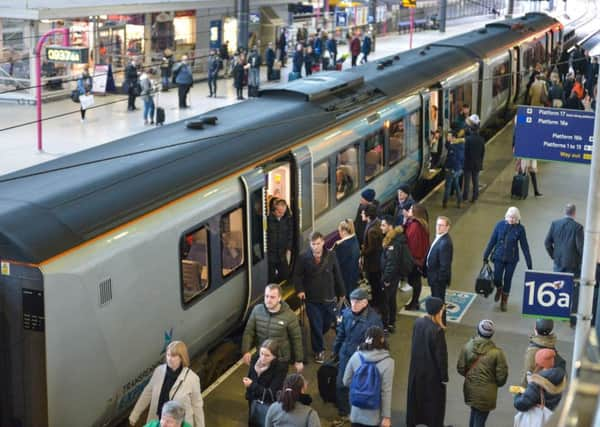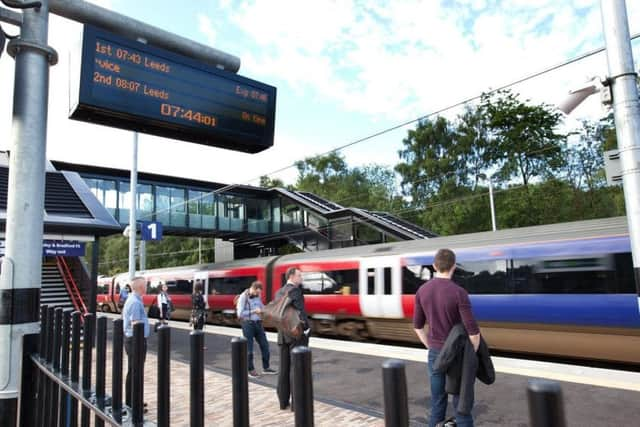Why we need a Department of Growth to oversee new infrastructure – Lisa Bowden


Here in Yorkshire we have already seen the transformational potential of new infrastructure including railway stations at Kirkstall Forge and Low Moor as well as the investment underway at Leeds Station. Meanwhile, regular congestion on local road demonstrates the costs of inaction.
But this is not just a regional challenge. Viable infrastructure solutions across the world face a range of political, social and economic threats. Bent Flyvbjerg, a professor at Oxford University, has identified what he describes as ‘the iron law of megaprojects’ – large infrastructure schemes are frequently delivered late and over budget.
Advertisement
Hide AdAdvertisement
Hide AdIn the UK, up to 80 per cent of projects are late and overspend, with taxpayers footing the bill. In Yorkshire and the Humber, delays and poorly-managed infrastructure is estimated to cost the public around £575m every year from 2030, equivalent to £600 each year for every taxpayer, unless we improve.


Why does this happen? New research from Mace identifies a number of factors that so often turn major infrastructure projects into ‘Frankenstein’s Monsters’.
Poor planning is one element, and too often there is insufficient clarity about what politicians are hoping to achieve from a project. Decisions are often driven by electoral pressures, and there is insufficient strategic thinking about intended outcomes. Procurement in the UK is generally poor taking too long and having poor outcomes. Forecasts are often wildly wrong and too optimistic, reflecting hubris rather than realistic ambition. One notorious example is the Channel Tunnel, which today carries only a third of the number of passengers predicted in 1995.
Project set-up also plays a major role. For example, there is often little continuity in project teams over the lifetime of infrastructure projects, with a rolling cast of contractors and consultants operating in silos.
Advertisement
Hide AdAdvertisement
Hide AdThis can result in a “don’t worry about it, someone will fix it later” attitude, leading to issues during the construction phase.


By spending too little on evaluation and analysis at the early stage, projects are often not as well thought through as they should be.
Investment in tools such as scenario testing and economic modelling is hugely underestimated.
Our research identifies several key areas where the UK can improve its performance on delivering infrastructure – which is particularly important as we navigate towards Britain leaving the EU.
Advertisement
Hide AdAdvertisement
Hide AdFirst, we recommend government takes steps to streamline the governance of infrastructure. A new government department should be established to identify and deliver infrastructure that will promote economic growth. At present, there is too little co-ordination between different government departments with responsibility for housing, planning, transport and energy, when in reality, there is often significant overlap. A ‘Department for Growth’ would bring co-ordination under one roof, improving the speed and efficiency of decision-making.
Second, the UK desperately needs to improve its public sector procurement processes. Government can use the opportunity provided by Brexit to remove the unnecessary red tape around procurement, enabling those managing major projects to secure high quality suppliers best placed to deliver on terms that suit the project.
Finally, we need to increase flexibility in the planning system to better value delivery of infrastructure projects. Planning for major schemes requires too much detail at an early stage, sometimes decades ahead of actually getting a spade in the ground. If a major project applies for planning now, because of the constraints, they may struggle to account for changes in technology and innovation in working practices.
The UK has significant advantages in delivering infrastructure, including an experienced workforce and high-quality private sector leadership. In recent years Britain has been involved in successful infrastructure schemes, most notably the London 2012 Olympics, but also internationally in cities such as Dubai. However, transformative infrastructure often takes too long to deliver, leaving us vulnerable to technological and social change. As we prepare to leave the EU, Britain must make itself megaproject-ready, by ensuring infrastructure can be delivered more quickly and efficiently.
Lisa Bowden is head of infrastructure in the North at construction company Mace.